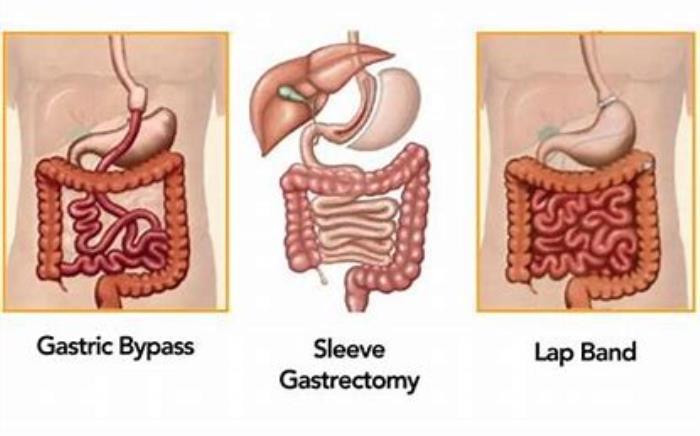Revision bariatric surgery refers to surgical procedures performed on patients who have previously undergone bariatric surgery but are experiencing inadequate weight loss, weight regain, or complications from the initial procedure. As the prevalence of obesity continues to rise, so does the need for effective surgical interventions.
Patients seeking revision surgery must undergo a comprehensive assessment to identify the underlying causes of their weight regain or insufficient results. This may include evaluating their dietary habits, exercise routines, and psychological factors contributing to their challenges.
Understanding the Need for Alternative Solutions
The need for alternative solutions in weight management arises when individuals find themselves struggling to maintain their weight loss after undergoing bariatric surgery. Factors such as changes in metabolism, psychological challenges, and lifestyle habits can contribute to weight regain. Understanding these challenges is crucial, as it helps patients identify potential pitfalls and develop effective strategies for long-term success. Alternative solutions may involve a combination of surgical and non-surgical approaches tailored to individual circumstances.

Patients seeking alternatives often consider various options, including non-surgical interventions and lifestyle changes. By exploring these alternatives, individuals can better understand their choices and find the most suitable path for their weight management journey.
Non-Surgical Weight Loss Programs: Overview
Non-surgical weight loss programs offer a variety of options for individuals seeking to manage their weight without undergoing additional surgical procedures. These programs may include medical weight loss, behavioral therapy, dietary counseling, and physical activity plans. By focusing on lifestyle modifications, non-surgical weight loss programs aim to provide patients with the tools and support necessary to achieve and maintain their weight loss goals.

One of the key advantages of non-surgical programs is their emphasis on sustainable lifestyle changes. Patients are encouraged to adopt healthier eating habits, increase physical activity, and develop coping strategies for emotional eating. These programs often involve regular monitoring and support from healthcare professionals, fostering accountability and motivation. By integrating non-surgical options into their weight management journey, patients can enhance their overall well-being and complement their surgical interventions if needed.
Medical Management of Weight Regain
Medical management of weight regain involves a comprehensive approach to address the factors contributing to weight gain after bariatric surgery. This process typically includes a thorough evaluation of the patient's medical history, lifestyle habits, and psychological factors. By identifying the underlying causes of weight regain, healthcare professionals can develop personalized strategies to help patients regain control over their weight.

Common interventions in medical management may include dietary modifications, pharmacotherapy, and behavioral therapy. Healthcare providers often recommend specific dietary plans that focus on nutrient-dense foods while limiting high-calorie, low-nutrient options. In some cases, weight loss medications may be prescribed to support appetite control and metabolic changes. Coupled with behavioral therapy, these strategies aim to empower patients with the skills and knowledge necessary to achieve and maintain a healthy weight, addressing both the physical and emotional aspects of weight management.
Lifestyle Modifications for Successful Weight Management
Lifestyle modifications play a pivotal role in achieving and maintaining successful weight management, especially for individuals who have undergone bariatric surgery. These changes encompass a wide range of factors, including dietary habits, physical activity, and emotional well-being. By adopting healthier lifestyle practices, patients can support their weight loss journey and prevent weight regain.
Key lifestyle modifications include following a balanced diet rich in whole foods, such as fruits, vegetables, lean proteins, and whole grains. Regular physical activity is also essential, as it helps burn calories, build muscle, and improve overall health. Additionally, incorporating stress management techniques, such as mindfulness and meditation, can address emotional eating triggers and promote a healthier relationship with food. By focusing on sustainable lifestyle changes, patients can achieve long-term success and improve their quality of life after bariatric surgery.
Nutritional Therapy: Working with a Dietitian
Nutritional therapy plays a vital role in weight management and overall health, especially for individuals undergoing or considering bariatric surgery. Collaborating with a registered dietitian can provide personalized dietary plans that align with specific health goals, preferences, and nutritional needs. Dietitians help patients understand portion control, meal timing, and food choices that promote satiety while ensuring essential nutrient intake. By assessing individual dietary habits and providing evidence-based recommendations, dietitians empower patients to adopt healthier eating patterns, ultimately enhancing the chances of successful weight loss and improving long-term health outcomes.

The Role of Behavioral Therapy in Weight Loss
Behavioral therapy is a critical component of effective weight loss programs, focusing on changing the underlying behaviors and thoughts that contribute to weight gain and unhealthy habits. This therapeutic approach helps individuals identify triggers for overeating, develop coping strategies, and set achievable goals. Techniques such as cognitive-behavioral therapy (CBT) can be employed to foster a healthier relationship with food and improve self-regulation. By addressing psychological factors related to eating behaviors, patients can cultivate resilience and maintain motivation throughout their weight loss journey, leading to sustained improvements in health and well-being.
Prescription Medications for Weight Management
Prescription medications can serve as an adjunct to lifestyle changes for individuals struggling with obesity. These medications are designed to aid weight loss by suppressing appetite, increasing feelings of fullness, or reducing calorie absorption. They are typically prescribed for patients with a body mass index (BMI) of 30 or higher, or a BMI of 27 with related health conditions. It's important to note that these medications are most effective when combined with dietary modifications and increased physical activity. Patients should work closely with their healthcare provider to determine the most appropriate medication, considering potential side effects and individual health profiles.

Endoscopic Procedures as Alternatives to Surgery
Endoscopic procedures are increasingly recognized as viable alternatives to traditional surgical weight loss options. These minimally invasive techniques involve the use of an endoscope to access the gastrointestinal tract without large incisions, reducing recovery time and associated risks. Common endoscopic procedures include the intragastric balloon and endoscopic sleeve gastroplasty. These interventions can help patients achieve significant weight loss by inducing early satiety and altering gastrointestinal physiology. Patients considering endoscopic options should consult with a qualified specialist to discuss their suitability and the expected outcomes of these procedures.
The Intragastric Balloon: How It Works
The intragastric balloon is a non-surgical weight loss device that occupies space in the stomach, promoting early satiety and reducing food intake. The balloon is inserted through the mouth and inflated with saline, creating a feeling of fullness that encourages patients to eat smaller portions. Typically, the balloon remains in place for six months, after which it is removed. Studies have shown that patients can achieve significant weight loss during this period, especially when combined with lifestyle changes. This option is particularly suitable for individuals who may not qualify for surgery or prefer a less invasive approach.
Gastric Sleeve Revision vs. Non-Surgical Options
When considering options for weight loss after an initial bariatric procedure, patients often weigh the benefits of gastric sleeve revision against non-surgical alternatives. Gastric sleeve revision involves surgical techniques to modify or enhance the original gastric sleeve procedure, aiming to improve weight loss outcomes. On the other hand, non-surgical options, such as dietary therapy, medication, and endoscopic procedures, may provide effective weight loss without the need for additional surgery. Each patient's circumstances are unique, and a thorough discussion with a healthcare provider is essential to determine the most appropriate path based on individual goals, health status, and previous experiences.
Benefits of Combining Non-Surgical Approaches
Combining non-surgical approaches can maximize weight loss results and enhance overall health for individuals seeking alternatives to traditional surgery. By integrating strategies such as nutritional therapy, behavioral therapy, and endoscopic procedures, patients can address multiple aspects of weight management simultaneously. This holistic approach allows for comprehensive support, targeting not only physical aspects of weight loss but also behavioral and psychological factors. Patients who engage in a combination of these treatments often report improved outcomes, sustained motivation, and better adherence to lifestyle changes, ultimately leading to more successful long-term weight management.
Success Stories: Patients Who Chose Alternatives
Many patients have successfully achieved their weight loss goals by opting for non-surgical alternatives to traditional bariatric surgery. For instance, individuals who have undergone the intragastric balloon procedure have shared their experiences of significant weight loss and improved health without the risks associated with surgery. Success stories often highlight the transformative effects of lifestyle changes, supported by dietary counseling and behavioral therapy. These narratives serve as inspiration for others considering similar paths, illustrating that effective weight management can be achieved through a combination of non-invasive strategies, personalized support, and commitment to health.
Cost Comparison: Surgical vs. Non-Surgical Solutions
When considering weight loss options, understanding the cost implications of surgical versus non-surgical solutions is essential. Surgical interventions, such as gastric bypass or sleeve gastrectomy, typically involve higher upfront costs, including hospital stays and follow-up care. In contrast, non-surgical alternatives, like endoscopic procedures and behavioral therapy, may offer more affordable options without compromising effectiveness. Patients should also factor in potential long-term costs related to follow-up treatments and medications. A detailed cost analysis, in consultation with healthcare providers, can help individuals make informed decisions based on their financial situation and health goals.
The Importance of Support Groups in Weight Management
Support groups play a crucial role in the journey of weight management, providing individuals with a sense of community and shared experiences. These groups foster an environment where participants can discuss challenges, celebrate successes, and exchange tips for maintaining healthy habits. Engaging with others who understand the struggles of weight loss can enhance motivation and accountability, making it easier to adhere to lifestyle changes. Support groups also offer emotional encouragement, reducing feelings of isolation and promoting a positive outlook on the weight management journey. Building connections with others can significantly enhance the overall success of weight loss efforts.
Nutritional Therapy: Working with a Dietitian
Nutritional therapy plays a vital role in weight management and overall health, especially for individuals undergoing or considering bariatric surgery. Collaborating with a registered dietitian can provide personalized dietary plans that align with specific health goals, preferences, and nutritional needs. Dietitians help patients understand portion control, meal timing, and food choices that promote satiety while ensuring essential nutrient intake. By assessing individual dietary habits and providing evidence-based recommendations, dietitians empower patients to adopt healthier eating patterns, ultimately enhancing the chances of successful weight loss and improving long-term health outcomes.
The Role of Behavioral Therapy in Weight Loss
Behavioral therapy is a critical component of effective weight loss programs, focusing on changing the underlying behaviors and thoughts that contribute to weight gain and unhealthy habits. This therapeutic approach helps individuals identify triggers for overeating, develop coping strategies, and set achievable goals. Techniques such as cognitive-behavioral therapy (CBT) can be employed to foster a healthier relationship with food and improve self-regulation. By addressing psychological factors related to eating behaviors, patients can cultivate resilience and maintain motivation throughout their weight loss journey, leading to sustained improvements in health and well-being.
Prescription Medications for Weight Management
Prescription medications can serve as an adjunct to lifestyle changes for individuals struggling with obesity. These medications are designed to aid weight loss by suppressing appetite, increasing feelings of fullness, or reducing calorie absorption. They are typically prescribed for patients with a body mass index (BMI) of 30 or higher, or a BMI of 27 with related health conditions. It's important to note that these medications are most effective when combined with dietary modifications and increased physical activity. Patients should work closely with their healthcare provider to determine the most appropriate medication, considering potential side effects and individual health profiles.
Endoscopic Procedures as Alternatives to Surgery
Endoscopic procedures are increasingly recognized as viable alternatives to traditional surgical weight loss options. These minimally invasive techniques involve the use of an endoscope to access the gastrointestinal tract without large incisions, reducing recovery time and associated risks. Common endoscopic procedures include the intragastric balloon and endoscopic sleeve gastroplasty. These interventions can help patients achieve significant weight loss by inducing early satiety and altering gastrointestinal physiology. Patients considering endoscopic options should consult with a qualified specialist to discuss their suitability and the expected outcomes of these procedures.
The Intragastric Balloon: How It Works
The intragastric balloon is a non-surgical weight loss device that occupies space in the stomach, promoting early satiety and reducing food intake. The balloon is inserted through the mouth and inflated with saline, creating a feeling of fullness that encourages patients to eat smaller portions. Typically, the balloon remains in place for six months, after which it is removed. Studies have shown that patients can achieve significant weight loss during this period, especially when combined with lifestyle changes. This option is particularly suitable for individuals who may not qualify for surgery or prefer a less invasive approach.
Gastric Sleeve Revision vs. Non-Surgical Options
When considering options for weight loss after an initial bariatric procedure, patients often weigh the benefits of gastric sleeve revision against non-surgical alternatives. Gastric sleeve revision involves surgical techniques to modify or enhance the original gastric sleeve procedure, aiming to improve weight loss outcomes. On the other hand, non-surgical options, such as dietary therapy, medication, and endoscopic procedures, may provide effective weight loss without the need for additional surgery. Each patient's circumstances are unique, and a thorough discussion with a healthcare provider is essential to determine the most appropriate path based on individual goals, health status, and previous experiences.
Benefits of Combining Non-Surgical Approaches
Combining non-surgical approaches can maximize weight loss results and enhance overall health for individuals seeking alternatives to traditional surgery. By integrating strategies such as nutritional therapy, behavioral therapy, and endoscopic procedures, patients can address multiple aspects of weight management simultaneously. This holistic approach allows for comprehensive support, targeting not only physical aspects of weight loss but also behavioral and psychological factors. Patients who engage in a combination of these treatments often report improved outcomes, sustained motivation, and better adherence to lifestyle changes, ultimately leading to more successful long-term weight management.
Success Stories: Patients Who Chose Alternatives
Many patients have successfully achieved their weight loss goals by opting for non-surgical alternatives to traditional bariatric surgery. For instance, individuals who have undergone the intragastric balloon procedure have shared their experiences of significant weight loss and improved health without the risks associated with surgery. Success stories often highlight the transformative effects of lifestyle changes, supported by dietary counseling and behavioral therapy. These narratives serve as inspiration for others considering similar paths, illustrating that effective weight management can be achieved through a combination of non-invasive strategies, personalized support, and commitment to health.
Cost Comparison: Surgical vs. Non-Surgical Solutions
When considering weight loss options, understanding the cost implications of surgical versus non-surgical solutions is essential. Surgical interventions, such as gastric bypass or sleeve gastrectomy, typically involve higher upfront costs, including hospital stays and follow-up care. In contrast, non-surgical alternatives, like endoscopic procedures and behavioral therapy, may offer more affordable options without compromising effectiveness. Patients should also factor in potential long-term costs related to follow-up treatments and medications. A detailed cost analysis, in consultation with healthcare providers, can help individuals make informed decisions based on their financial situation and health goals.
The Importance of Support Groups in Weight Management
Support groups play a crucial role in the journey of weight management, providing individuals with a sense of community and shared experiences. These groups foster an environment where participants can discuss challenges, celebrate successes, and exchange tips for maintaining healthy habits. Engaging with others who understand the struggles of weight loss can enhance motivation and accountability, making it easier to adhere to lifestyle changes. Support groups also offer emotional encouragement, reducing feelings of isolation and promoting a positive outlook on the weight management journey. Building connections with others can significantly enhance the overall success of weight loss efforts.
Evaluating the Effectiveness of Alternative Treatments
When considering alternative treatments for weight management, it's crucial to evaluate their effectiveness based on scientific evidence and patient outcomes. Various non-surgical options, such as dietary counseling, behavioral therapy, medications, and endoscopic procedures, have been studied for their impact on weight loss and overall health improvement. Effectiveness can vary based on individual factors, including personal commitment, pre-existing health conditions, and support systems. Analyzing success rates, patient testimonials, and clinical research can provide valuable insights into which alternatives may work best for specific needs, enabling patients to make informed decisions about their weight loss journey.
Considering Your Options: Factors to Weigh
Choosing the right treatment for weight management involves weighing several factors. Patients should consider their current health status, weight loss goals, and preferences for intervention types. Important considerations include the potential risks and benefits of each option, the required commitment in terms of time and lifestyle changes, and financial implications. Additionally, the availability of support systems, such as access to dietitians, support groups, and healthcare providers, can significantly influence the success of non-surgical alternatives. Taking the time to thoroughly assess these factors can empower patients to select the most suitable path for their individual circumstances.
Long-Term Outcomes of Non-Surgical Alternatives
Research indicates that non-surgical alternatives for weight management can lead to sustainable weight loss and improved health outcomes when combined with lifestyle changes. For instance, individuals participating in structured behavioral therapy often report significant long-term success in maintaining weight loss compared to those who rely solely on dietary modifications. Similarly, procedures like the intragastric balloon can lead to meaningful weight reduction and enhance metabolic health, although long-term results can vary based on individual commitment to dietary and lifestyle adjustments. Tracking outcomes over time helps patients understand the potential longevity of their results and the importance of ongoing support and maintenance strategies.
Nutrition Tips for Optimal Healing After Revision Bariatric Surgery
Understand essential nutrition tips for optimal healing after undergoing revision bariatric surgery. Focusing on nutrient-dense foods, adequate hydration, and balanced meals can significantly impact recovery and long-term health outcomes, making diet a key factor in the healing process.
Exploring the Latest Research on Revision Bariatric Surgery
Delve into the latest findings and advancements in revision bariatric surgery. Understanding ongoing research can provide insights into new techniques, improved patient outcomes, and the evolving landscape of bariatric care, helping patients make informed decisions about their surgical options.
Best Revision Bariatric Surgery in India
The Best Revision Bariatric Surgery in India helps patients who have not achieved the desired results from their initial weight loss surgery, offering advanced techniques to improve outcomes and ensure long-term success.
Best Revision Bariatric Hospitals in India
The Best Revision Bariatric Hospitals in India are equipped with modern technology and skilled teams, providing comprehensive care that includes pre-surgery assessments and post-surgical follow-up for optimal recovery.
Revision Bariatric Surgery Cost in India
The Revision Bariatric Surgery Cost in India is competitive and transparent, offering patients affordable treatment options while maintaining the highest standards of care and personalized attention at top hospitals.
Best Revision Bariatric Surgeons in India
The Best Revision Bariatric Surgeons in India have extensive experience in weight loss revision procedures, ensuring precise surgical techniques and individualized patient care to achieve the best possible outcomes.
Frequently Asked Questions About Bariatric Alternatives
What are the main types of non-surgical bariatric alternatives?
Common alternatives include dietary therapy, behavioral therapy, prescription medications, and endoscopic procedures such as the intragastric balloon.
How effective are these alternatives compared to surgical options?
Non-surgical options can be effective for many individuals, especially when combined with lifestyle changes. However, surgical options may provide more significant weight loss for those with severe obesity.
Are there any risks associated with non-surgical treatments?
While generally less invasive, non-surgical treatments can still have risks and side effects. For instance, medications may lead to gastrointestinal issues, and endoscopic procedures carry a risk of complications.
How long do the results of non-surgical treatments last?
Long-term success largely depends on individual commitment to lifestyle changes and follow-up care. Many people experience sustainable weight loss with ongoing support and maintenance.
How do I choose the right treatment option for me?
Consider factors such as your health status, weight loss goals, preferences, and the availability of support systems. Consulting with healthcare professionals can provide personalized recommendations.